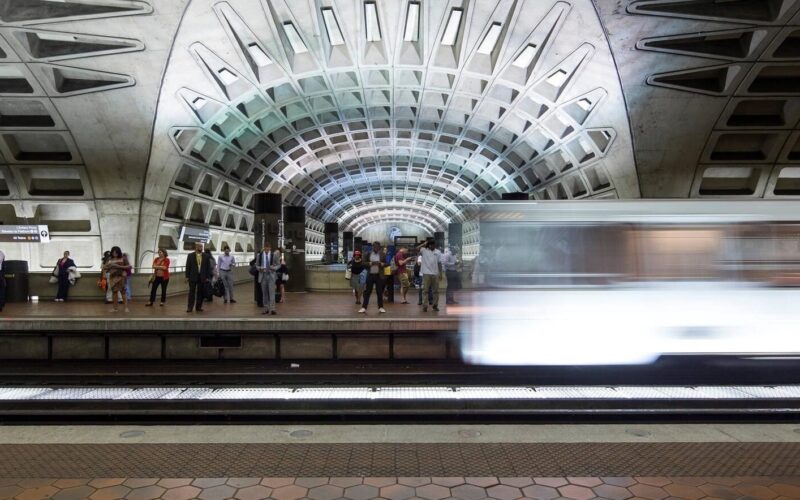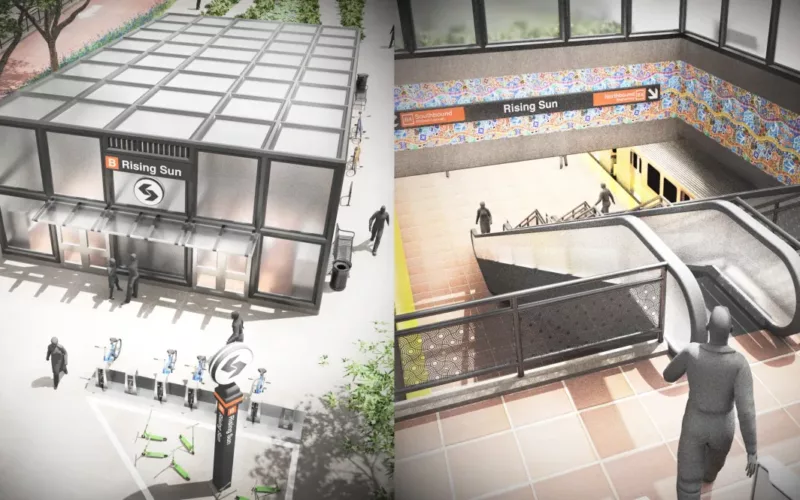
How cities and transit agencies can best work with new mobility services
Cities and transit agencies can situate new services like Uber and car2go within broader urban transportation strategies to strengthen transit and reduce car dependence, but to do so they must take the lead in defining roles and partnerships. Public sector actors who allow development of these services to overtake them are less likely to serve the public well and take advantage of opportunities that new actors and services provide.
TransitCenter’s new Public Interest, Private Mobility report urges government to claim this leading role, and provides a guidebook for effective partnership using contemporary examples. The publication notes that the entire field is new and in a highly experimental phase. “Partnerships have been coming out with increased frequency this past year,” Zak Accuardi, a TransitCenter staff member who co-authored the report, told Curbed. “They’ve been happening so fast that even with a team here dedicated to conducting this research, it’s been hard to keep up. There’s a lot of confusion and concern over these services, and the exact role that they play.”
Nonetheless, Private Mobility, Public Interest identifies four basic principles to guide public agencies in approaching new mobility companies:
Partner to reinforce transit’s strengths
Emerging mobility services provide agencies with service models that can help them spend money more effectively. New data generated by transportation network companies and bikeshare systems can also strengthen agency planning efforts. For example, Florida’s Pinellas Suncoast Transit Authority is subsidizing Uber on previously marginal, expensive bus routes with the goal of reallocating resources to strengthen its core bus service. The agency directly confronted the equity issues of replacing buses with Uber: in response, Uber opened its first phone bank for arranging rides.
Leverage agency-controlled assets
Because emerging mobility services depend on public infrastructure like roads and parking spaces, agencies have considerable leverage to negotiate partnerships that advance the public interest and other agency goals. BART’s policy for car-share providers is to grant them more parking spaces at stations, if they can demonstrate that they are generating at least eleven trips per space. Similarly, Seattle has given car2go prime parking in exchange for service coverage in areas where the company sees lower demand. Compare to New York, where car2go has simply set up shop in Brooklyn and Queens without any agreement with the city, and the service area closely maps wealthy and gentrifying districts.
Plan for a streamlined user experience
Securing high quality data and using open technology and data standards can allow riders to access and pay for a variety of mobility options more conveniently. Astute cities have included open data requirements in their contracts with bike share companies, creating a rich new data source for planning cycling infrastructure. Open bike share data has also enabled partnerships like those between Chicago’s Divvy Bikes and Bike Share Toronto and Transit App, where bike share members can unlock bikes by phone (similarly available in NYC between Transit App and car2go). Transit App was also recently announced as the official app of Boston’s MBTA, a system that has pioneered open transit data. Prospects for a seamless phone-fare system across multiple public and private transport modes seem close where open data is the norm.
Be open to new ways of providing useful transit
To realize more flexible planning and cost-effective service models, agencies must be open to and proactive about working with new companies. That can mean that burdensome procurement and spending procedures need to change. Los Angeles Metro has established an unsolicited procurement policy to attract non-traditional vendors — it encompasses emerging mobility providers and creates a single point of contact and standardized process for new service proposals. The standard approach to procurement was also discarded by the Kansas City Area Transportation Authority in creating its partnership with Bridj for subsidized on-demand van service.
These general principles were gleaned by studying emerging partnership and through over 100 interviews with government and private sector practitioners.
One thing new mobility companies won’t do is replace high capacity transit in big cities. Though the emergence of Uber and similar services has caused both anxiety and wishfulness in this regard, cars and vans simply cannot match the people-moving power of buses and trains in dense, congested areas. Public Mobility, Private Interest attempts to dispel the hype surrounding e-hail services, while spotlighting the opportunities they provide. As Slate put it, the research “cuts through both the Silicon Valley utopianism and the left-wing naysaying.”
Emerging mobility services can certainly complement buses and trains to make cities across the country more accessible via public transportation, and easier to negotiate without owning a car. But in cities, including the boomtowns in Texas and across the South, it is no substitute for expanding and adequately funding public transit, or for rigorous policy and service review to ensure that transit service that is provided has the highest possible utility.
 On the Brink: Will WMATA’s Progress Be Erased by 2024?
On the Brink: Will WMATA’s Progress Be Erased by 2024?
The experience of being a WMATA rider has substantially improved over the last 18 months, thanks to changes the agency has made like adding off-peak service and simplifying fares. Things are about to get even better with the launch of all-door boarding later this fall, overnight bus service on some lines starting in December, and an ambitious plan to redesign the Metrobus network. But all of this could go away by July 1, 2024.
Read More To Achieve Justice and Climate Outcomes, Fund These Transit Capital Projects
To Achieve Justice and Climate Outcomes, Fund These Transit Capital Projects
Transit advocates, organizers, and riders are calling on local and state agencies along with the USDOT to advance projects designed to improve the mobility of Black and Brown individuals at a time when there is unprecedented funding and an equitable framework to transform transportation infrastructure, support the climate, and right historic injustices.
Read More